CII Urges Government For Consultation Before Finalising EV Deadlines
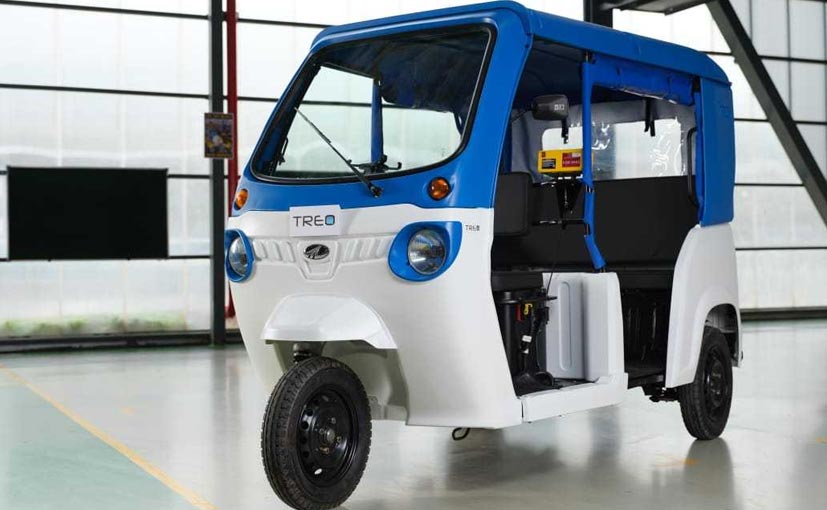
- CII calls for consultations with multiple stakeholders
- CII says electric two and three-wheelers need to be cost-effective
- India has a large number of two-wheelers used for personal mobility
The Confederation of Indian Industry (CII) the apex industry association of India, has urged the government for multi-stakeholder consultations with a special focus on affordability of consumers before setting a deadline for replacing conventional internal combustion engines on two and three-wheelers with electric powertrains. The CII has asked the government for a proper, well-aligned roadmap, formulated in consultation with industry stakeholders, before finalising goals and timelines for electrification of vehicles in India. The CII statement comes after the Society of Indian Automobile Manufacturers (SIAM) said that the deadlines for two-wheeler and three-wheeler manufacturers to convert to electric will disrupt the industry.

The electric two-wheeler industry in India is still at a nascent stage with no organised supply chain
Also Read: Electric Two-Wheeler, Three-Wheeler Targets Need To Be Practical, Says SIAM
"Constructive disruptions driven by market forces coupled with enabling policies is the kernel of any innovation and we are hopeful that the same is adopted as India readies itself for the advent of new technologies in mobility including electric vehicles," Vikram Kirloskar, President, CII, said in a statement. The CII said that the apex body has engaged with stakeholders from various interlinked industries like renewable electricity and power, battery makers and auto manufacturers to create recommendations that will help India achieve its goals of lowering emissions and conform to commitments on climate change.
"It is important to set the goals right and work towards them as we look at fuel efficiencies and choices for future mobility solutions. The processes of how we get there should be driven by market and industry, to get the best results for the nation," the CII president said. The CII has advocated a three-pronged strategy to make this transformational shift in transportation in India.
Also Read: Is India Ready To Go Fully Electric With Two And Three-Wheelers?

Charging infrastructure, as well as en ecosystem of spares and support technology needs to be established
The apex industry body says one of the first strategies to adopt is to set the right goal that should be seen from a macro perspective of carbon footprint and energy security. The target and the timeline set to achieve the desired goal needs to be deliberated with diverse stakeholder consultations at the initial phase so that it is both sustainable and achievable. The industry body maintains that while India has managed to position itself globally with ambitious targets, it will be important to take stakeholders along, in setting the targets.
Also Read: Proposal To Make Two-Wheelers Electric Has Challenges, Say Observers
Secondly, the CII urges the government to be technology-agnostic in its approach as the transportation sector like any new industry segment is witnessing huge transformative innovations in vehicles and batteries. The final strategy, says CII, to make the transformative mobility mission effective revolves around affordability of customers which will depend on market forces. Vehicles like two-wheelers and three-wheelers are preferred modes of transport in rural areas and towns where most of India resides. While on one hand, motorcycles are used by small businessmen and farmers in rural areas, scooters are often used as family vehicles - more as a second two-wheeler used by women or young adults.
The CII's statement comes in response to a proposal by the government's think-tank Niti Aayog to completely ban three-wheelers with internal combustion engines by 2023, and two-wheelers with internal combustion engines below 150 cc by 2025.
Latest News
 car&bike Team | Mar 3, 2026Ducati Desmo450 MX Teased Ahead of India LaunchThe Ducati Desmo450 MX is expected to be launched in India soon, as early as sometime later in March 2026.1 min read
car&bike Team | Mar 3, 2026Ducati Desmo450 MX Teased Ahead of India LaunchThe Ducati Desmo450 MX is expected to be launched in India soon, as early as sometime later in March 2026.1 min read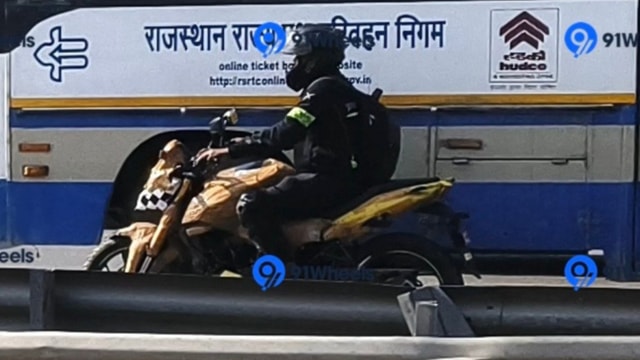 car&bike Team | Mar 3, 2026Is this the Vida VXZ Electric Motorcycle?A test mule of an almost production-ready electric motorcycle has led to speculation that it could be the upcoming Vida VXZ electric motorcycle.2 mins read
car&bike Team | Mar 3, 2026Is this the Vida VXZ Electric Motorcycle?A test mule of an almost production-ready electric motorcycle has led to speculation that it could be the upcoming Vida VXZ electric motorcycle.2 mins read Shams Raza Naqvi | Mar 3, 2026Vinfast Unveils Two New Ultra Luxury Models, Restructures Brand LinesThe Vietnamese car company has announced that its vehicles will fall in three brand lines with Lac Hong being the luxury brand.1 min read
Shams Raza Naqvi | Mar 3, 2026Vinfast Unveils Two New Ultra Luxury Models, Restructures Brand LinesThe Vietnamese car company has announced that its vehicles will fall in three brand lines with Lac Hong being the luxury brand.1 min read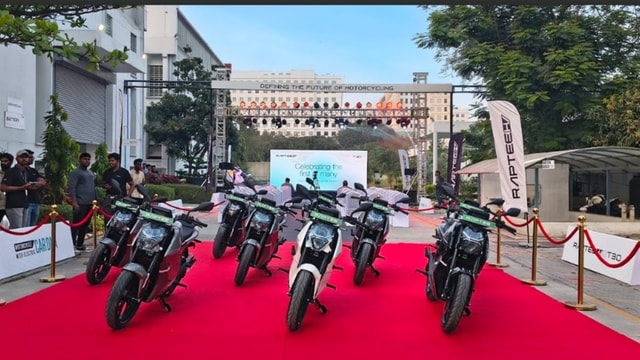 car&bike Team | Mar 3, 2026Raptee.HV T30 Electric Motorcycle Deliveries BeginThe Chennai-based start-up Raptee.HV has begun large-scale customer deliveries of the brand’s first electric motorcycle – the Raptee T30.1 min read
car&bike Team | Mar 3, 2026Raptee.HV T30 Electric Motorcycle Deliveries BeginThe Chennai-based start-up Raptee.HV has begun large-scale customer deliveries of the brand’s first electric motorcycle – the Raptee T30.1 min read Shams Raza Naqvi | Mar 3, 2026From Vitara Brezza To Brezza: Maruti’s Subcompact SUV Completes A Decade In The MarketThe SUV has seen a major switch from being just a Diesel model to being just a Petrol in the last few years.2 mins read
Shams Raza Naqvi | Mar 3, 2026From Vitara Brezza To Brezza: Maruti’s Subcompact SUV Completes A Decade In The MarketThe SUV has seen a major switch from being just a Diesel model to being just a Petrol in the last few years.2 mins read car&bike Team | Mar 2, 2026Yezdi Roadster Red Wolf Launched at Rs 2.10 LakhYezdi has expanded the Roadster line-up with a new Red Wolf colourway, now the most premium shade in the range.1 min read
car&bike Team | Mar 2, 2026Yezdi Roadster Red Wolf Launched at Rs 2.10 LakhYezdi has expanded the Roadster line-up with a new Red Wolf colourway, now the most premium shade in the range.1 min read
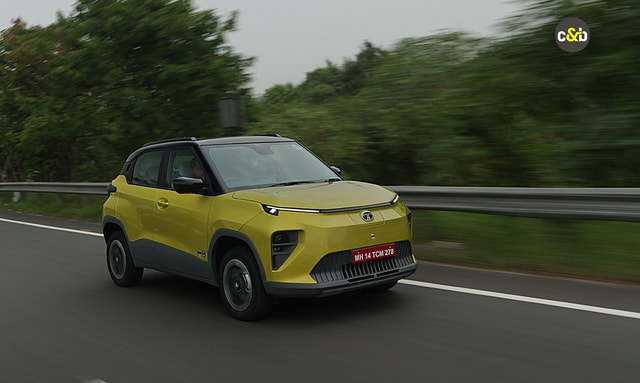 Bilal Firfiray | Feb 28, 2026Tata Punch EV Facelift Review: More Range, More Sense, Less MoneyThe Tata Punch EV facelift gets a bigger 40 kWh battery, faster 60 kW DC charging, improved thermal management, and better real-world range, and all of that at a lower introductory price. But does it become a more complete package now?6 mins read
Bilal Firfiray | Feb 28, 2026Tata Punch EV Facelift Review: More Range, More Sense, Less MoneyThe Tata Punch EV facelift gets a bigger 40 kWh battery, faster 60 kW DC charging, improved thermal management, and better real-world range, and all of that at a lower introductory price. But does it become a more complete package now?6 mins read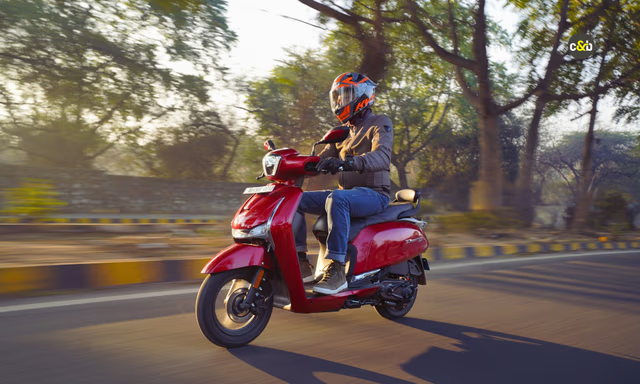 Preetam Bora | Feb 24, 2026Hero Destini 110 Review: Simplicity, RefinedThe Hero Destini 110 is a no-nonsense commuter that is simple, comfortable and above all, fuel efficient. In 2026, when buyers are spoilt for choice, is it good enough to consider?1 min read
Preetam Bora | Feb 24, 2026Hero Destini 110 Review: Simplicity, RefinedThe Hero Destini 110 is a no-nonsense commuter that is simple, comfortable and above all, fuel efficient. In 2026, when buyers are spoilt for choice, is it good enough to consider?1 min read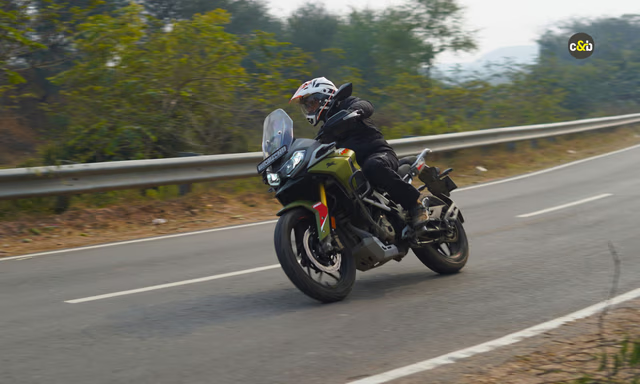 Preetam Bora | Feb 23, 2026TVS Apache RTX Road Test Review: Redefining the Entry-Level ADVAfter spending some time with the TVS Apache RTX in traffic, the daily commute, as well as on open highways, one thing becomes clear: the RTX is trying to redefine the entry-level ADV segment. But is it without fault?1 min read
Preetam Bora | Feb 23, 2026TVS Apache RTX Road Test Review: Redefining the Entry-Level ADVAfter spending some time with the TVS Apache RTX in traffic, the daily commute, as well as on open highways, one thing becomes clear: the RTX is trying to redefine the entry-level ADV segment. But is it without fault?1 min read Girish Karkera | Feb 20, 2026Road Test: 2025 VinFast VF7 AWD Sky InfinityFlagship all-electric SUV from the Vietnamese car maker gets most of the basics right.1 min read
Girish Karkera | Feb 20, 2026Road Test: 2025 VinFast VF7 AWD Sky InfinityFlagship all-electric SUV from the Vietnamese car maker gets most of the basics right.1 min read Jaiveer Mehra | Feb 18, 2026New BMW X3 30 Vs Mercedes-Benz GLC 300: Midsize Luxury SUV FaceoffWith the new X3 30, BMW has a direct competitor to the petrol GLC 300, but which is the luxury SUV for you?1 min read
Jaiveer Mehra | Feb 18, 2026New BMW X3 30 Vs Mercedes-Benz GLC 300: Midsize Luxury SUV FaceoffWith the new X3 30, BMW has a direct competitor to the petrol GLC 300, but which is the luxury SUV for you?1 min read























































































































